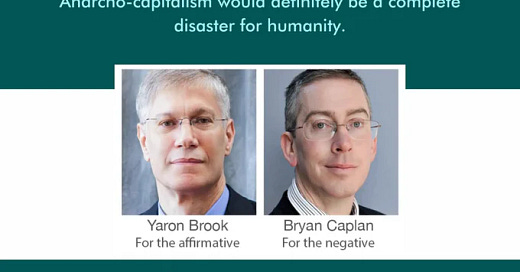Thanks to everyone who attended Monday’s debate, and a special thanks to Gene Epstein for running the Soho Forum. By the power of Gene, I’ve done a total of four Soho debates: the robot domination debate with Robin Hanson, the defund college debate with Ed Glaeser, the Covid immigration debate with Mark Krikorian, and now the anarcho-capitalism debate with Yaron Brook.
While the debate format gave me ample time for rebuttal, I still have much to get off my chest.
If Yaron Brook is any indication, the Ayn Rand Institute improved a lot since 1989, when I spent two full weeks at the ARI-affiliated Jefferson School. Back then, ARI would purge you even for talking to libertarians about anything. Now its chairman publicly debates me on anarcho-capitalism. And he was an affable fellow in the green room. I struggle to reconstruct the philosophical rationale for this revisionism - but I’m glad it happened.
To be blunt, Brook had little to add to Rand’s straw man attack on anarcho-capitalism in “The Nature of Government.” Yes, it is possible for free-market defense agencies to fight. But it is routine for governments to fight. Yes, it is possible for free-market legal codes to allow what should be forbidden, and forbid what should be allowed. But it is routine for governments to allow what should be forbidden, and forbid what should be allowed.
Rand and Brook commit the classic statist error of advocating an idealized government, then mistaking a pile of tautologies for arguments. Here’s Rand:
If physical force is to be barred from social relationships, men need an institution charged with the task of protecting their rights under an objective code of rules.
This is the task of a government — of a proper government — its basic task, its only moral justification and the reason why men do need a government.
A government is the means of placing the retaliatory use of physical force under objective control—i.e., under objectively defined laws.
Logically, this is as lame as me saying:
If physical force is to be barred from social relationships, men need an industry charged with the task of protecting their rights under an objective code of rules.
This is the task of a protection industry — of a proper protection industry — its basic task, its only moral justification and the reason why men do need a protection industry.
A protection industry is the means of placing the retaliatory use of physical force under objective control—i.e., under objectively defined laws.
What’s the alternative to tautological trickery? One approach is the study of history. Unfortunately, history reveals no strong examples of either minarchy or anarcho-capitalism. The United States wasn’t exactly minarchy even in 1880, and Iceland wasn’t exactly anarcho-capitalism even in the year 1000. Still, these are probably history’s closest approximations to minarchy and anarcho-capitalism, and we can learn a lot by studying them. Long story short: Both worked well for their era, but Iceland decayed into statism more slowly. (For the state-of-the-art on Iceland, see this recent paper by my colleagues Vincent Geloso and Peter Leeson).
Furthermore, history teaches us a great deal about how markets and governments work. One big lesson is that private property, free competition, and reputation normally deliver much better performance than public property, coercive monopoly, and faith in authority. Another big lesson is that despite textbook naysaying, markets have provided virtually every good you can imagine - including police, courts, and law. And as I mentioned in Q&A, company towns worked quite well in 19th-century America despite their bad press.
History aside, we can learn a lot from standard economic reasoning. Given firms’ incentives, what should we expect them to do? If you think that private firms would always attack each other, why wouldn’t you think that independent governments would always attack each other? If you think independent governments can sustain lasting peace, why wouldn’t you think that private firms can sustain lasting peace?
Before the debate, I wondered if Brook would advocate world government. Superficially, this solves the “lack of a final arbiter” problem. Since civil war is always possible, this is only a pseudo-solution. But I can still see the appeal.
I quickly discovered that Brook has no problem with the existence of multiple independent governments, or even the existence of many small independent governments. Why don’t all of his fears about anarcho-capitalism apply equally to a world with many small independent governments? Brook’s only answer was that a monopoly of force within each geographical territory is crucial for peace. (And also, anarcho-capitalism where real estate developers bundle police and courts counts as “government”).
What’s wrong with this answer? Simple: The smaller governments get, the more cross-border disputes you’ll have. If you rob a bank in Luxembourg, then flee to Belgium, how does the bank get justice? If you think small governments can amicably handle these disputes , why can’t private firms do the same? This question is especially pressing because Brook, like me, favors open borders. If people can move freely, they will - and so will their disputes.
Brook granted that in a world of fully moral people, anarcho-capitalism would work. A minor concession? Hardly, because it means that all of his tautological arguments are simply false. If you can imagine functional anarcho-capitalism, then “anarcho-capitalism” can’t be a contradiction in terms.
More importantly, once you grant that anarcho-capitalism would work with 100% moral people, this raises obvious questions: “Would it work with 99.9% moral people? How about 99%?” Once you legalize freedom, what share of the population will even remain “criminals”?
Brook barely responded to my point that the distance from minarchy to anarcho-capitalism is miniscule. But like I said, once you have full freedom of contract, you should expect contracts to include binding arbitration clauses. And if arbitration is truly binding, there simply isn’t much for government to do. Don’t like a law? Write a contract appointing your brother as the arbiter. (Why would the other side sign? Because you give them a better price to compensate them, of course).
If the distance from minarchy to anarcho-capitalism is so small, who cares? My best answer is that even the smallest government carries a high demagogic risk. Under minarchy, power-lusters will continue to turn to politics - and gradually rechart a course back to big government. In free markets, in contrast, what drives elites is not power-lust, but greed. Which, as my book in progress argues, is much better and much safer. In slogan form: Markets do the good things that sound bad; governments do the bad things that sound good. If we ever get to minarchy, refusing to take the final step into anarcho-capitalism would be short-sighted indeed.
Subscribe to Bet On It
Caplan and Candor







"If the distance from minarchy to anarcho-capitalism is so small, who cares? My best answer is that even the smallest government carries a high demagogic risk. Under minarchy, power-lusters will continue to turn to politics - and gradually rechart a course back to big government."
Laying aside the question of what exactly the smallest trace of government might look like or how much power-lust can possibly be permitted, the concession that even the smallest impurity ends up spoiling the whole, does not inspire confidence in any anarcho-capitalist system. From this I would conclude that anarcho-capitalism is the inverted pendulum of social systems with regard to Homo sapiens. Or, that if everyone was a clone of Bryan Caplan then anarcho-capitalism would surely work? Perhaps this explains why there is no record of its existence to date. With a half-life so short, its moment passed unnoted.
Bryan,
Though of course it would be silly of me to tell someone who has debated orders of magnitude more often than I how to improve, I thought I’d share some thoughts:
First, your blog comments raise a confusion that I think should be avoided. “Small” or “smaller” government has two meanings: a) geographically smaller (eg, Lichtenstein) and b) less powerful (e.g. the US government of 1800.) You seem to think ("The smaller governments get, the more cross-border disputes you’ll have”) Brook is speaking about the former but I believe he really means the latter (e.g. minarchy.)
Now some thoughts on Brook’s Objectivist position:
1. Objectivists have a fixation on GEOGRAPHICAL MONOPOLY. It’s very important to them that only one decision maker exists in any fixed location, so conflict is avoided. The underlying assumption is that, Plato-Form-like, this geographical monopoly is eternal and unchanging. But of course that is ridiculous. The US government geographical monopoly at its founding was much smaller than now. People in the geographical area of Texas, in the span of two decades or so, went from being governed by Mexico to being governed by Texas to being governed by the US. The northern border of the US was disputed (54°40' or fight!). The Oklahoma panhandle was not always Oklahoma’s. So the question comes up: If a person living under one government can find himself suddenly being ruled by the laws of a different government, without even moving, how is that different from switching from Mastercard Defense to Visa Security?
2. Objectivists seem to have great difficulty understanding why government services are not natural monopolies. I’ve found the following analogy helpful: In the 1960s (I would say to Brook “In your childhood…”) everyone (EVERYONE) thought phone service was a natural monopoly. To change phone companies one would have to move to another geographical area. And yet today we can all recognize that one can, sitting at one’s home computer, change phone companies as easily as we can place an Amazon order. Literally by clicking a few buttons. Yet our phone service is not chaotic. We don’t even notice a service difference. The only thing that changes is who we pay our phone bill (our “taxes”) to.
AT&T, Verizon, T-Mobile, and many others (I just Googled 42 available cellular carriers) do not fight one another. They cooperate so I can call anyone without even knowing what carrier they use. Just like I can buy things at Niagara Falls without knowing if the seller is a Canadian or US citizen.
Today I can choose to be governed by Canadian law only by moving to Canada. But Canadian citizens can live in the US. Why can’t I choose to stay in my US home and with a few computer clicks become a Canadian citizen? There is still a geographical monopoly. Only now it’s composed of the sum of all the personal property owned by the subscribers rather than a geographic mass seen on a map, a point you made in debate.
In any case, you did a great job and I’m not a fan of Oxford style scoring. It depends far too much on who the audience is and how honest they are. But I thought you might enjoy the phone company analogy.